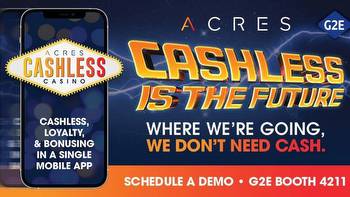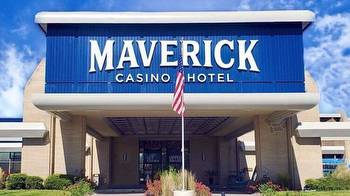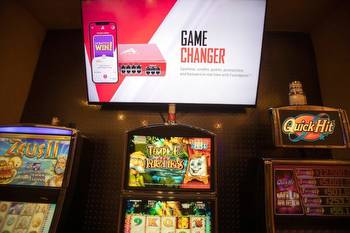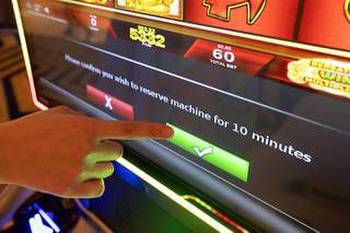Ask the Slot Expert: Do casinos need to identify advantage video poker players?
Ask the Slot Expert: Do casinos need to identify advantage video poker players?
I recently read about a product whose time -- if it ever had a time -- has come and gone. But first....
Everyone in the gaming industry knows John Acres' name, but I doubt if any players recognize it. Still they feel his influence on the slot floor every day.
In 1981 he developed the first player tracking system. In 1985 he co-founded Mikohn Gaming, which developed progressive jackpot systems. In 1992 a new company, Acres Gaming, developed the next generation of player tracking and bonus systems. Acres Technology aims to leave mark on gaming industry again
This is around the time when our paths first crossed. He was kind enough to answer my questions about how the programs in slot machines work. I was also able to attend a seminar he gave about his player tracking and bonusing system at what was then the big gaming show, the World Gaming Congress.
I remember one of the big innovations in his system was something they called At the time, some player tracking systems required you to play a certain number of coins before you could earn a point. The card readers in many casinos in Atlantic City displayed the number of coins you still needed to play before you would be awarded a point. If you pulled your card before completing the countdown, you lost all the progress you had made toward earning a point.
With , every penny you played went toward earning points. You could switch machines as much as you liked and earn points on all of your play.
It's somewhat tragic that we've lost this progress in some new slot clubs. When Boyd changed its slot club a few years ago, your tier level in the club went from being based solely on action to being based on action and game played. Slot players could move to upper tiers more quickly than video poker players because slot games required fewer dollars played to earn a tier credit. Even worse for video poker players, the amount of action required to earn a tier credit was tied to the long-term payback of the paytable -- the better the paytable, the more dollars required.
I was at Gold Coast with Jean Scott shortly after the new club went live and players had figured out the tier credit situation. One of her disciples said to her, "I went to the club booth and told them I didn't like the new system and I'm not going to play here as much in the future."
I thought, "That's pretty much the idea."
The casino was saying, "Don't expect our best offers if you're going to play our best games. We're going to give more to players who are worth more to us."
One consequence of the new tier credit system is if you pull your card -- or switch games on a multi-game machine -- you lose the progress you had made toward a tier credit. One player posted that he had played for quite a while switching between video poker paytables on one machine, had earned a good number of points, and had earned very few tier credits. That's when he learned about tier credit progress resetting to zero.
My cousin got bitten by this "feature" of the new club. We needed to earn, say, 10 tier credits to get a box of cookies. She only played slots (and slots earned tier credits at $5 per), so it was easy to figure out that if she played 50 points she would earn the 10 tier credits needed.
But she had switched machines when her point total was not divisible by 5. Even though she had earned 50 points, she had only 9 tier credits.
The system still works this way, as far as I know. I haven't done any tests to see if it has changed.
Some of the casinos that used the Acres system were Mandalay Bay and Stations Casinos. Some of the machines in Red Rock casino still have stickers about various promotions tied to the Acres system, Acres Advantage.
IGT bought this Acres company. If your video poker machine reboots and you see a message about IGT Advantage Player, it doesn't mean that the machine is loading software to identify advantage players. It just means that the machine is loading the player tracking module of the IGT Advantage system. It's [IGT Advantage] Player, not IGT [Advantage Player].
Acres has formed a new company and its player-tracking system, Acres Foundation, will be able to help casinos deal with the Advantage Player problem.
Slot machines have gotten chattier over the past three decades. Early player tracking systems and progressive controllers kept track of how much was played by intercepting pulses sent to the internal meter that incremented with each coin played. Today the computer inside the slot machine can share much more data with the central computer and the central computer can send more data to the machine. You can Google "SAS protocol" to find more information. Just be sure to ignore the entries for Serial Attached SCSI, which is something completely different. There is also a competing protocol called G2S (Game to System).
According the Acres site, the Foundation system "captures and reports a machine's entire SAS report on every spin." The Review-Journal article linked above answers the question about what can be done with all that data.
For openers, it can help a casino company learn even more than it knows now about its customers. More important, casinos can do something proactively if they sense that players are becoming unhappy with their losses.
"I can detect when you’re becoming unhappy and I can either send an employee out to talk to you, I can send a message to your phone, I could put a message on the slot machine screen," Noah Acres said. "The message might be something like, 'Hey, for the next 10 minutes, we’ll double all your pays.' It could be, 'Here’s 20 bucks of free money.' It could be a free drink coupon. It could be anything. It's up to the casino what they want to do. But the fact is, right now, the casinos can’t measure an experience in real time and they can’t do anything about it and now we’re giving them the tools to do both."
Sounds all rainbows and puppy dog tails until the next paragraph.
The system does that by monitoring play. On video poker machines, for example, it can determine if a player makes mistakes in basic strategy. Rather than see a player quit or go to a rival casino for a change in luck, managers monitoring play can be proactive in how they approach the customer.
The flip side of determining if a player makes mistakes in basic strategy is determining that a player doesn't make mistakes.
A new product created by Acres Manufacturing will make it easier for gaming operators to identify advantage players. The Optimal Poker Analyzer not only identifies and tracks advantage players but allows casinos to offer casual video poker players benefits that match their level of play.
Acres envisions casino operators being able to increase offers to high margin (or casual players) while reducing offers to low margin, or advantage, players.
"Casinos have to protect themselves against advantage players," [Noah] Acres says. "The regular players are the ones who pay the price."
Protect against advantage players? Really? In 2021? If there are opportunities out there that a casino feels it should spend I-don't-know how many dollars to protect itself against players who know what they're doing and can get a significant advantage over the casino, I sure would like to know about them.
In the six years I've been in Las Vegas, I've seen NSU machines disappear, video poker go from 1 dollar earning 1 point to 2 dollars earning 1 point, the advantage on NSU on multiplier days go from $30 per $10,000 played to $20, and the ability to play NSU at breakeven every day go away.
Casinos have already dealt with correlating benefits with a player's theoretical worth. Long gone are the days that Bob Dancer wrote about when casinos would give unbelievable perks to players playing positive expectation video poker or devise promotions that gave players a percent or more advantage.
When I told Anthony Curtis that I was flagged as an advantage player at a casino, he said, "How much damage can a dollar video poker player do?" Even multiplied by 100 or more, I would add.
I've never seen a footnote in an annual report that said that a loss was due to advantage video poker play. A lucky whale at Baccarat, yes, but not advantage players playing dollar video poker.
Casinos have also limited the profitability of playing positive expectation paytables by offering them in low denominations only, by increasing the amount of play required to earn a point (if you can even earn points on them), and by setting them to deal very s.l.o.w.l.y, thereby decreasing the number of hands one can play per hour AND how much one can earn per hour.
Casino accountants can count their beans and tell me I'm wrong, but I suspect that advantage play today is not much more than a rounding error on a monthly Profit and Loss statement. I don't think they really know, though, because they can only see how much a person has played on a particular paytable, when they played (Only on multiple points days?), and how much they've won or lost. They don't know whether a loser was skilled and unlucky or a winner had no clue what he was doing and was lucky. They have to infer advantage play from a player's results because they can't measure performance separate from the luck of the draw.
Well, at least not until now.
Maybe there's no reason to be concerned. Acres did say the system could be used to increase offers to casual players. So the casino would be able to give better offers to the NSU player who was attracted by the "99.8% or better" sign above the machines and is playing based on hunches than the player who has memorized a strategy chart. Instead of basing offers on paytable alone, offers can be based on paytable and player skill level. Will the data be used just to give better rewards to players who play the best paytables poorly?
I have a question. Are there enough instances in which the proper hold goes against the cards you would hold on a hunch to be able to reliably determine that a player is an advantage player?
Send your slot and video poker questions to John Robison, Slot Expert™, at slotexpert@slotexpert.com. Because of the volume of mail I receive, I regret that I can't reply to every question.





























